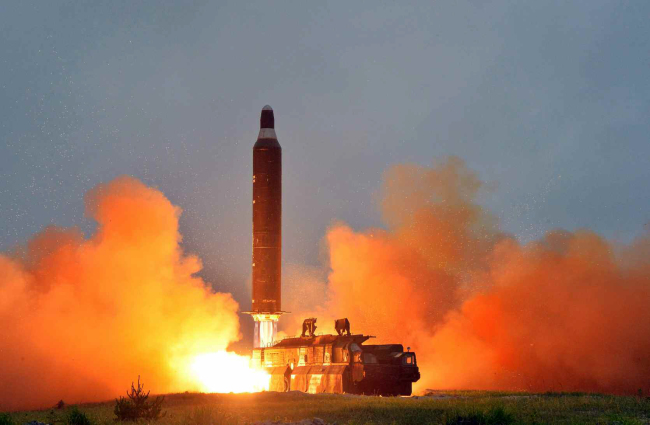N.K. missile launches show need for strong missile defense: Carter
By KH디지털2Published : June 23, 2016 - 11:28
U.S. Defense Secretary Ash Carter on Wednesday said North Korea's latest test of an intermediate-range ballistic missile underscores the need for the United States and its allies to build strong missile defenses.
"I don't know whether it was successful. I don't know what the test objectives were, as seen by the North Koreans," Carter said during a visit to the Army base in Fort Knox, Kentucky, according to a transcript provided by the Pentagon.
"But for whatever reason, and with whatever level of success, this shows the need for us to continue to do what we're doing, which is build these missile defenses of various ranges to protect both our South Korean allies, U.S. forces on the Korean Peninsula, Japan and U.S. territory," Carter said.
The North fired two Musudan missiles off its east coast early Wednesday in its fifth and sixth attempts to test the missile. The first one exploded in midair, but the second flew about 400 kilometers before landing in the East Sea in an indication of progress.
"I don't know whether it was successful. I don't know what the test objectives were, as seen by the North Koreans," Carter said during a visit to the Army base in Fort Knox, Kentucky, according to a transcript provided by the Pentagon.
"But for whatever reason, and with whatever level of success, this shows the need for us to continue to do what we're doing, which is build these missile defenses of various ranges to protect both our South Korean allies, U.S. forces on the Korean Peninsula, Japan and U.S. territory," Carter said.
The North fired two Musudan missiles off its east coast early Wednesday in its fifth and sixth attempts to test the missile. The first one exploded in midair, but the second flew about 400 kilometers before landing in the East Sea in an indication of progress.

On Thursday, the North's official Korean Central News Agency said that the latest test of what it calls the Hwasong-10 medium long-range strategic ballistic missile, known as Musudan in the outside world, was successfully carried out with leader Kim Jong-un in attendance.
"The missile flew for longer," Carter said. "In previous tests, it didn't. It flew for such a short period of time. It's hard to believe that that was the objective of the test. This one flew for a longer period. But I can't say more than that.
"But no matter what this or that test went to in terms of time of flight and so forth doesn't change the plans that we've had for quite a while, which is that we need to stay ahead of the threat by making sure that our missile defenses are good qualitatively but also constantly expanding," he said.
Following the North's long-range missile test in February, Seoul and Washington launched official talks about placing a Terminal High Altitude Area Defense battery in the South to bolster defense against missile threats from the communist nation.
Sources have said that the THAAD talks have moved forward to a point where the two sides are now looking at candidate sites for deployment, including not only existing U.S. military bases but also mountainous areas away from cities. (Yonhap)








![[KH Explains] Hyundai-backed Motional’s struggles deepen as Tesla eyes August robotaxi debut](http://res.heraldm.com/phpwas/restmb_idxmake.php?idx=644&simg=/content/image/2024/05/16/20240516050605_0.jpg&u=20240516155018)









![[Today’s K-pop] NewJeans hits 600m Spotify streams with ‘Ditto’](http://res.heraldm.com/phpwas/restmb_idxmake.php?idx=642&simg=/content/image/2024/05/17/20240517050510_0.jpg&u=)